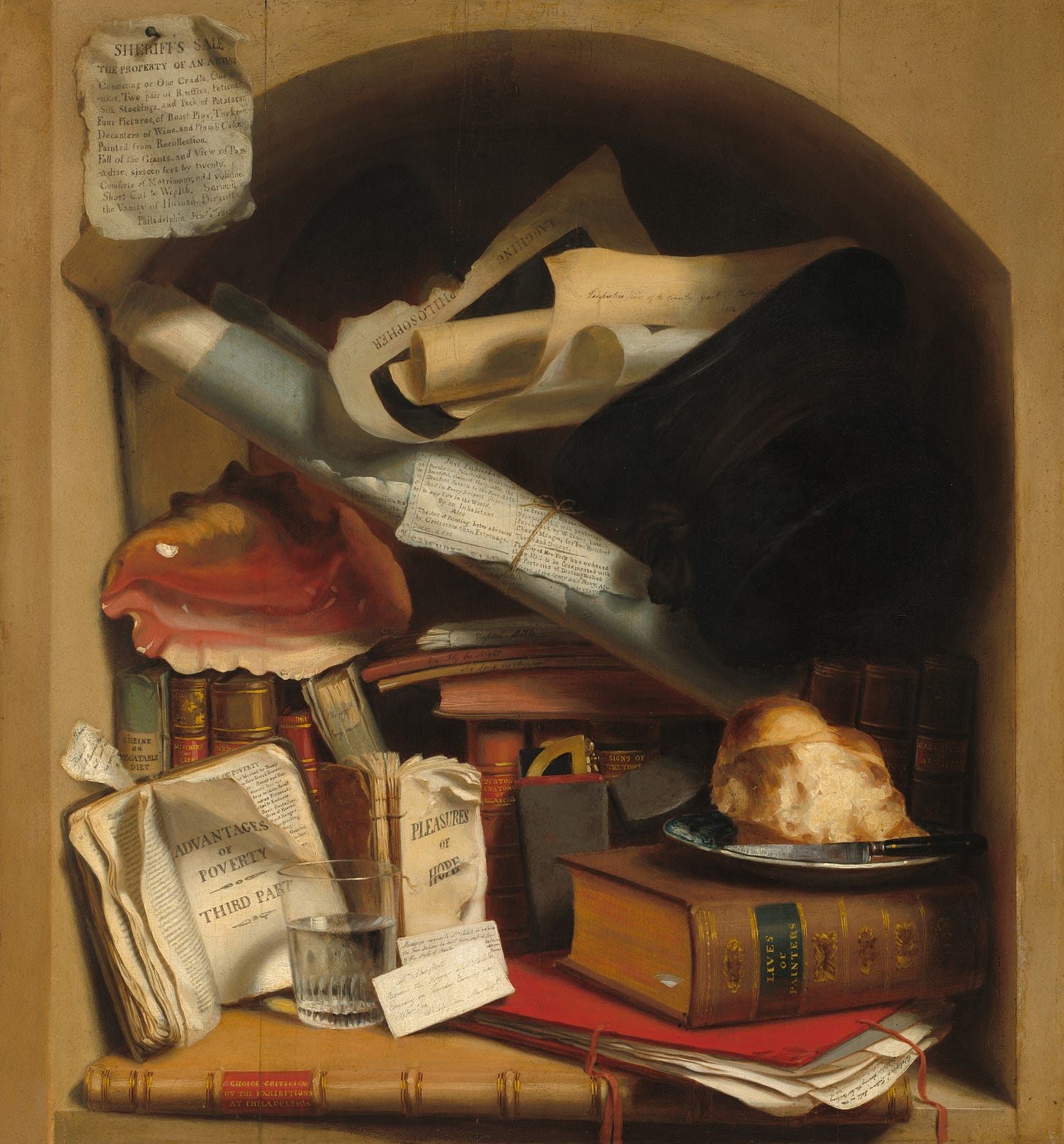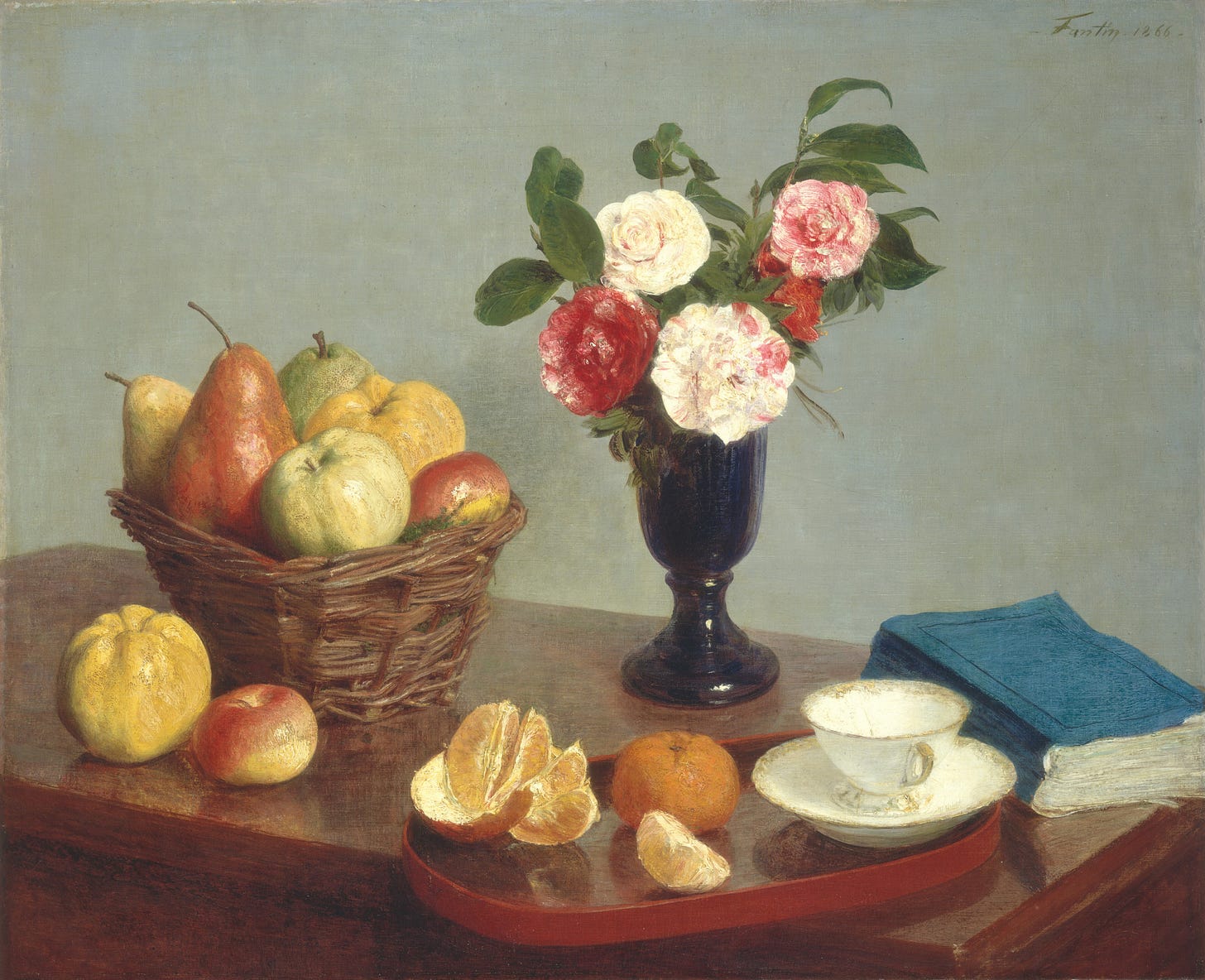Reading as a Way of Coming Home
Reflections on literary life, identity, and the myth of productivity.
Reading has consumed a hefty three-quarters of my almost 22 years while I have lived, breathed, wept, eaten, talked, and slept on a turning globe in the middle of a vast universe. Compared to how large some things are, books ultimately seem minuscule. Some books next to other books look like pamphlets compared to a medieval Bible. But if I happened to stand next to the Atlantic Ocean—or, say, the sun—with Crime and Punishment in my hand, I think we know which one would win the contest for largest object.
Novels and nonfiction alike inspire my writing, conversations, thoughts, and practically every arena of life I step into.
Recently, though, I’ve become increasingly aware of the sheer mass of words being stuffed into my brain on a daily basis. Worried that I might explode, I’ve frantically rushed through all my current reads so that I can dumb down the list to one book—vowing to myself that I won’t read more than one at a time from now on. My only consistency with that vow has been to repeatedly renew the promise to be more consistent. Sometimes I’m not in the mood to read fantasy, so I prefer to have a contemporary fiction on the nightstand to substitute in. Or maybe fiction as a whole isn’t satisfying my restless mind, and nonfiction will do.
At the end of last year, I wanted to procure an app that would allow me to track how many books I read this year, how many I read each month—and hey presto! I found one. Not only did it do both of those things, but it also summarizes what sort of reader you are based on your top genres. It was wonderful. Except… maybe not.
The years of putting a two before another number feel like they are stretching into some endless, chaotic eternity. I don’t particularly like being 21. Some people will certainly roll their eyes at that; middle-aged adults might even get angry: What I wouldn’t do to be in my twenties again! On the other end of the spectrum, some of you are more than happy to be past the twenties stage of life, in a settled rhythm, relieved not to be floundering in a world where “place” seems impossibly distant. I don’t know—my circle is rather small in the grand scheme of eight billion people.
Books have always been the one constant in my universally unstable world ever since I could read. They have carried me through breakups—both friend and romantic varieties—cross-country moves, international trips, depressive episodes, loneliness, reckless joy, and boredom. I once found myself reading a borrowed book from our neighborhood’s little lending library, swinging lazily in a child’s swing, the haze of a summer afternoon about me, sunlight bathing me in its kind rays, while I sifted through the book’s contents—not particularly caring what words were on the page. It was more of an ethereal, multifaceted memory of a moment that mattered to me then, and recalling it now, I can’t even remember the title. I don’t have it anymore.
At some other, very different time, I recall fastidiously consuming The Brothers Karamazov, intent on every agonizing and intricate sentence, while tears seemed to sprout from my eyes without the slightest intention of distracting me from my arduous work—yes, it felt like work, reading that particular tome, but delightful, fulfilling, and enlivening work. I was curled up, housesitting, all responsibilities forgotten in the drama and psyches of the Dostoevskian characters. Russia all of a sudden arrived at my doorstep, enticing me to step into its depths, with all the political intrigue of socialism and the disbanding of serfdom. I dogged Ivan’s steps as he vainly attempted to make sense of life while simultaneously discarding the relational aspects of God. Dmitry shocked my sense of moral conduct while leaving me heartbroken at his desire to love and be loved deeply. All the real-world problems around me took on shapeless grey forms in the stark harshness of Dostoevsky’s metaphysical struggles that threatened to reform my worldview (they definitely did). My world felt distinctly like a cold Siberian blizzard—even in the blazing sun of a summer in the South—while I partook of the Karamazovs’ lives.
I didn’t know I was capable of reading as much as I did in the car until I re-read almost the whole of A Tale of Two Cities.
Lately, though, something has felt missing in my reading life. If you are a reader, you know that reading and life go together like those complementary jeans and knit pullovers. And when it comes to having multiple lives operating all at once, I have to believe my reading one has an identity all its own—like a soul. But stories that normally come alive as moving pictures in my mind have instead settled into the page as black characters and nothing more. If the words do leap off the page, it’s only in some convoluted, messy pattern that aches to be known but cannot be. Why?
Well, partially because my own life feels so consistently inconsistent, and frankly, living is just inconvenient at the moment. When waking up feels like a bore, I hardly think my imagination will support conjuring images to pair with 800+ page fantasy epics. But I think it is precisely this failure of will and lack of resilience that persuades me to bury my nose in a book—not to perform an act of escapism, but to drag me into this endless literary hamster wheel of…
completion.
It’s an icky word in this context.
Completing your degree program.
Completing a complex meal.
Completing the gardening project.
Completing a difficult job task.
Completing your grueling run.
These are wonderful examples of the word being used in a light favorable to it.
“Completing your book” just doesn’t carry the same complimentary tone, though. Oh, it’s not so black and white, I suppose. Completing my first Dostoevsky did bring me a sense of satisfaction. When I read The Count of Monte Cristo or the Mistborn trilogy, I felt that sense of rightness and accomplishment. I patted myself on the shoulder: Well done, you read a tome.
No, I don’t think it’s some awful thing to be glad to put a book aside once you’ve digested it evenly and holistically.
But I think I’ve taken completion to another level with reading, lately. It’s been all touch and go with every volume I intend to pick up and really soak into. The act of reading fiction versus nonfiction is quite different, as is the way your brain stores the information. But it still remains that favorable conditions for both kinds of reads include a mind that isn’t reading simply to finish. Reading to read is a waste of the effort put in to read. In my mind, there’s been a sort of half-hearted attempt to just achieve—to zoom through wordy paragraphs in order to shout triumphantly, “I’ve finished!” Can accomplishment accompany especially difficult tomes? I think so. Should I read only to accomplish? Mmm. I’m not sure.
As a child, my dad read to me every night. I would be tucked into bed, beloved stuffed creatures surrounding me on all sides, thoughtfully given their own pillows and blankets. Settling down deep under the comforter, I would close my eyes and imagine Sandleford Warren from Watership Down, Gondor and the Shire from The Lord of the Rings, the Stone Table and wintry landscape of The Lion, the Witch, and the Wardrobe. I played with the Wingfeather children, fell in love with Prince Caspian, felt the breath of Aslan, the sorrow of trading Neverland for growing up. My father’s voice, with his intonations and vibrant character imitations, lulled me into a doze, half-dreaming of fantastic lands beyond my small world.
My life was informed by extraordinary people and imaginary shores, lifted out of our grey reality and into places where colors were incredibly vibrant, where everything felt so much more… real. These stories, these people, began to bleed into my everyday, and suddenly the pretend games I acted out with my brother became all too real: my nostrils catching the acrid smoke of a dragon’s breath, war wounds suddenly burning from a fierce battle, the cooling relief of water on my parched tongue after a long wandering in a faraway desert. Even in moments of eating lunch or afternoon quiet time, the world was enchanting.
Now, as an adult, not only do my eyes see magical creatures, but my soul connects with Jane Eyre, Dmitry Karamazov, Susan Pevensie, Éowyn, and Emily St. Aubert. I smile through tears as I read about Jane’s suffering and acute loneliness while she chooses right over self. I shake my head at Susan’s vanity, realizing all too well that I am capable of it too.
Book characters are mirrors where we have the opportunity to see the self clearer than we ever have before. They are home, yes—where the pain of this life disappears—but they are more real too, in a sense, than the sensations we experience off the page.
Looking back on those cherished weeks I spent wolfing down the entire Harry Potter series—an experience I can never have again—I feel a sense of warmth, love, affection, and loyalty to, dare I say, people who do not even exist. Ashamedly, I think I have more regard for those teenagers than I do for some people who do exist. Hogwarts is my home away from home, a place where the impossible becomes entirely possible. Where trees are alive, wooden sticks are imbued with fantastical elements, and creepy robed beings suck out souls.
The power of Dumbledore, the affection and constancy Ron, Hermione, and Harry have for each other; parental loss and loneliness; the evil of Tom Riddle—all draw you into a world so tangible you can taste the chocolate frogs, every-flavor beans, and gag at the cockroach clusters.
Whichever books you’ve read and loved, you know that feeling of coming home. You recognize the familiar ache of wishing your bookish friend would leap off the page and face your demons with you. You weep as you watch a character fall into a trap you yourself might also fall for.
Coming back to the roots of my love for reading, I’ve come to understand that
reading is not about completion, numbers, or amounts— it’s about returning both to yourself and to the places that offer unique understanding of why our world is the way it is.
Setting a goal of reading a certain number of pages a day isn’t evil or wrong. Choosing to read three (or fifteen) books a month should be something you do if you enjoy that sort of challenge. But I know that for my own life, I want to do what I love—and that includes creating space for my enjoyment of reading to take precedence over completion or challenge.
My bookish life does not need to be infected by societal norms like accomplishing, completing, finishing, working on, or any other such verb. I know that I read quality literature. I know that I read romcoms. And I have the privilege of enjoying both as they are.
When the pressure is there to zoom through a particularly difficult read, I miss the opportunity to build a relationship with the people I’m learning about. I miss the beauty of the natural world being described and the darkness of haunted castles—all because I’m in a hurry to get to the next thing.
So I have been gifted the chance to read endless volumes of fabulous quality and to thoroughly find pleasure in both epic worlds and small villages, mighty heroes and humble Hobbits.
I don’t want to rush. I don’t want to strive. I don’t want pressure.
I just want to read—and fall in love with words again.
Join the chat—a warm corner for talking books, their impact on real life, and all the personal stories in between.








Oh I love this! Soo well-written 💗